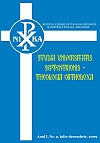Libertate versus destin în gândirea părinţilor şi scriitorilor bisericeşti anteriori primului Sinod Ecumenic
Liberty versus destiny in the vision of fathers and church writers prior to the 1st Ecumenical Council
Author(s): Cristian BoloşSubject(s): Theology and Religion, Systematic Theology
Published by: Editura U. T. Press
Keywords: The liberty; destiny; responsibility; determinism; human liberty; freedom;
Summary/Abstract: God knows what the man’s deeds before they are commited, but He never determins them. If destiny would determine a person’s life, than his entire endeavor would become meaningless making the liberty itself redundant. An activity is never performed under the rule of destiny, but every person does freely good or evil. Free will constitutes the noble title of man, making his progress possible and in the same time encompassing over himself the moral responsibility. For this very reason has free will been a frecvently discussed topic among thinkers and philosophers.His contradicting concepts can all be gathered under the same title of determinism, which affirms that human activities are determined by a number of factors. The post-scriptural Fathers and writers plead unanimously for the importance of human liberty, argumenting that God cannot salvage a person without his or her will. Salvation can be achieved only through the collaboration between the free will of man and the holy grace. Salvation is only possible through synergy. God offers the grace to all the people, but the man is expected to show complete participation to this action. The work between man and God can be seen in good deeds. These are the proof that the man possesses rationality and freedom. Every good deed has the mark of man’s collaboration with God.
Journal: Studia Universitatis Septentrionis. Theologia Orthodoxa
- Issue Year: IV/2012
- Issue No: 2
- Page Range: 165-192
- Page Count: 28
- Language: Romanian

